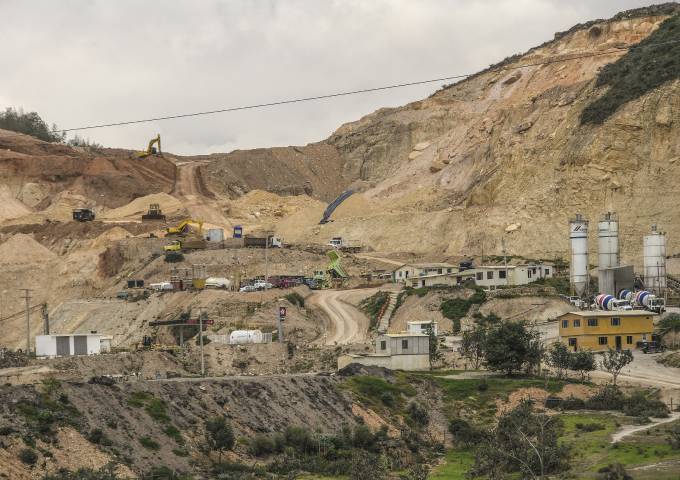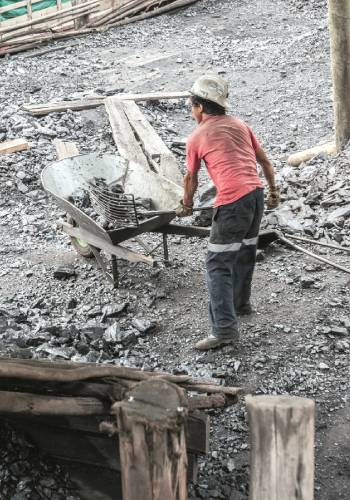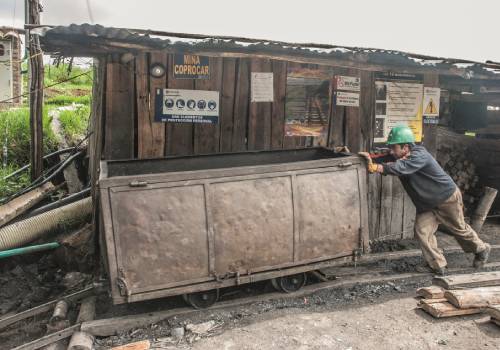Legal mining also contributes to deforestation
By: Inés Elvira Ospina Echandía
Photos:
Environment

By: Inés Elvira Ospina Echandía
Photos:
In 2016, the Constitutional Court, through sentence T445, ordered the National Government to conduct a scientific investigation that could identify the impact of mining activity on Colombian ecosystems. The Instituto Humboldt performed the study, and its results led two professors of the Faculty of Natural Sciences of Universidad del Rosario, Benjamín Quesada and Nicola Clerici, to decide to further investigate legal mining’s contribution to the deforestation figure of the national territory.
Many of the obtained results surprised them. “We found, for example, that between the years 2001 and 2018, the num - ber of deforested hectares in the concessions of legal mining had increased exponentially, particularly in 2017, the year in which the contribution of legal mining to national deforesta - tion went from 1% to 6%. An equivalent of 25 thousand hectares”, affirms Benjamín Quesada, who has a doctorate in climatology.
This and other figures were acquired after merging two datasets. The first dataset was the Colombian mining land registry, which shows the exact delimitation of the legal min - ing possessions in the country. The second dataset was a set of high-resolution space–time data that evidences changes in the forest cover per area of 30m² x 30m² across all the national territory between the years 2001 and 2018.

At this stage of the work, Andrés González, an environmental engineer of Universidad de Antioquia, joined as a research assistant. With his experience in data management, the team was able to conclude the study in a year. While this text was being written, it was waiting to be reviewed in the scientific journal Environmental Research Letters for its publication.
Checking the results
The research study specifically sought to quantify the spatial and temporal deforestation dynamics in relation to legal mining concessions in Colombia; identify deforestation associated with concessions and mined materials; evidence the challenges; and provide policy recommendations related to controlling deforestation in the mining sector.
“We estimate a deforestation loss of 146,540 hectares in relation to legal mines between 2001 and 2018. Therefore, deforestation due to legal mining concessions contributed to around 3.4% of the extent of Colombian deforestation in those years”, explains Quesada.
“We do not know the exact reason for this growing trend. The Regional Autonomous Corporations have the power to monitor, sanction, and intervene in these mining concessions, but the results allow us to question whether they really do it”, says the professor. Moreover, according to the investigation, between 150 and 200 legal mining concessions each result in the deforestation of more than 400 hectares of forest in the country—the equivalent of approximately 500 soccer fields, although it is important to clarify that the practice is not generalized across all the national territory.
The study shows that 20% of legal mining in Colombia is done without noticeable deforestation and that half the concessions in the country deforest less than one hectare per concession. Therefore, the researchers considered it important to detail the figures by department and found that between 2001 and 2018, Antioquia, Bolívar, and La Guajira accounted for 60% of the national deforestation because of legal concessions.
In Antioquia, which has seen an increase in recent years in the exploitation of gold, 23% of the deforestation in 2018 occurred due to its legal mining concessions. For its part, the department of La Guajira shows a figure of 19% in terms of the concessions for the exploitation of coal.
It is worth noting that gold and coal are the most important materials legally extracted in Colombia and are associatd with deforestation, particularly in recent years. The study allowed the researchers to calculate that 15 trees are directly logged in the country for every kilogram of gold and 20 trees for every kiloton (unit of mass that equals one thousand metric tons) of legally mined coal.

“It should be noted that not all companies are doing things wrong. Some are following the rules of the so-called good practices, and their deforestation is considered acceptable. This situation occurs in half the legal mining concessions in Colombia, there and thereabouts, which is why specific cases of extreme or unacceptable deforestation must be reviewed. Our research seeks useful data so that national and regional authorities can take the necessary measures”, assures Profesor Quesada.
It is about applying the law
After analyzing the results, the researchers made recommendations that can contribute to the effective containment of deforestation because of legal mining concessions. The first recommendation is to apply the law, as the legal framework is clear and even the Constitution of 1991 discusses conservation, sustainable development, and sanctions for noncompliance.
ot check them,” says the professor. To adopt and demand best practices from mining companies is another recommendation agreed upon by the researchers. “We saw that 50% of legal mining companies deforest less than one hectare. If that good practice is adopted as a general rule, a reduction of more than 90% of the current deforestation due to the legal mining sector would be achieved”, explains the doctor in meteorology and physics oceanography of the environment.
If the authorities do not take measures regarding this matter, the truth is that the country is expected to lose almost 400,000 hectares over the next two decades if all the requested mining concessions are assigned. This is particularly serious considering that, as per Agencia Nacional Minera (National Mining Agency), the requested mining titles as of February 2019 accounted for 8.56% of the national territory.

“We estimate a deforestation loss of 146,540 hectares in relation to legal mines between 2001 and 2018. Therefore, deforestation due to legal mining concessions contributed to around 3.4% of the extent of Colombian deforestation in those years”, explains Benjamín Quesada, who has a doctorate in climatology and is a professor at the School of Natural Sciences.